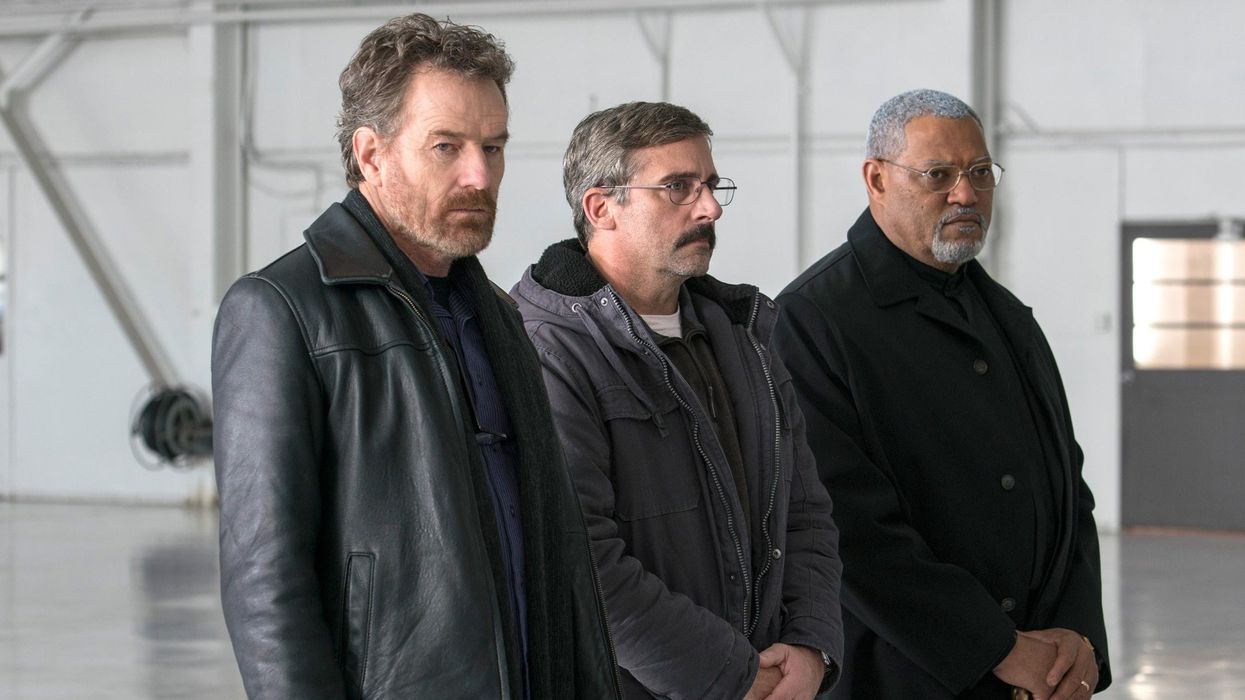Richard Linklater on Why 'Last Flag Flying' is a Road Movie, Not a War Movie
Richard Linklater takes himself (and all of us) out of the comfort zone.

The role of Richard Linklater's Last Flag Flying as curtain raiser for the 55th New York Film Festival was mired by fateful and unfortunate circumstance. The audience, four days removed from a Sunday full of NFL protests and the unbearable debate which followed, couldn't help but draw connections with the themes of the director's latest film.
When asked by an eager audience member how the cast and filmmakers felt about the film fitting into that debate, the ever-outspoken Laurence Fishburne was quick to dismiss the notion. "We're not fittin' into that, we ain't got nothin' to do with that," he insisted with a flair of characteristic vigor. "We are so far removed from the ridiculousness of this conversation," Linklater laughed off in agreement.
"This doesn’t really have the trappings of a war movie. We’re not in battle, it’s domestic. It’s more a road movie."
Last Flag Flying is a difficult film to process. It tells the story of three former marines, played by the always reliable Steve Carell, Bryan Cranston, and Fishburne, who fought in Vietnam and reunite on a road trip thirty odd years down the line to bury the son of Carell's character. The film takes place during the height of the Iraq war in the mid-aughts where the son has been killed in action.
Whatever ridicule the filmmaker and actors place upon the National Anthem debate, it's hard not to acknowledge that a film with themes as oddly patriotic as this almost come off as borderline propaganda. At a time when the public opinion on our government is at an all-time low, it is a strange sandbox for a director known for his countercultural movies to be playing around in.
"It's a lot of emotions and a lot of mixed feelings to say the least," Linklater remarked. "I think a lot of people who serve in our military can be very patriotic, love their country, believe deeply that they're fighting for freedom, democracy, justice, that's the mission. And then you find out...you're going to be screwed over by the institution in varying degrees and I think we experience that through these characters."
So it's a war movie then, right? That's what much of the press has been saying. But Linklater wouldn't call it that. "This doesn’t really have the trappings of a war movie. We’re not in battle, it’s domestic. It’s more a road movie. It’s probably in that genre. It just happens to be these vets in this particular situation."

The film, however, may not really be Linklater's to define. While he certainly had a hand in adapting the story from its original novel, much of the screenplay should be credited to the novel's author Darryl Ponicsan who joined the director, Fishburne, and Cranston on stage. "I kind of object to pigeonholing pictures," Ponicsan chimed in. "I prefer ‘war movie’ to ‘road movie,’ but in my mind it’s an adult film. You know, without that connotation. It’s a movie for grown-ups. It’s a movie about some pretty deep stuff that even the filmmakers might not be able to get to the bottom of."
"We went behind the scenes to show you things that you’d never even heard of much less seen."
"If you are in a genre, I like movies that show you a different angle," Linklater suggested in response. "Particularly when you talk about the Iraq war, they had learned enough to ignore everything—to ignore the deaths, to not have photos of flags draped over coffins. It was really just a political calculation. By doing that, it really keeps a distance from the public, it keeps truths hidden. They went overboard with Vietnam, and they hadn’t figured out that it was all public, it was all open to the press. You saw the way that affects the population. So they just did it a whole different way. I like the idea that we went behind the scenes to show you things that you’d never even heard of much less seen."
Now, it was Fishburne's moment to step up and take a swing. "It’s really about the people that are left behind," he offered. "In terms of war movies, we don’t really see a lot of them that are about the people that are left behind. Those that are affected by the deaths of those who served, and the sacrifices they make."
Ultimately, it was Linklater who may have done the best job of contextualizing his film's themes. "I think the film is really a contemplation of truth, honesty. What does that mean? If a country’s honest with their people or is a mission forthright with what the real mission is to the soldier. It’s a real complex area. And personal truth. Truth is a really blunt instrument. We were thinking a lot about that as we did it."
The artist's search for truth combined with an overarching message that our government should be honest, open and transparent with its people is by far the most relevant of all the issues Linklater attempted to tackle in Last Flag Flying. And while he may have muddied up a few of the others, the film succeeds in driving this point home.
Last Flag Flying hits theaters November 3, 2017.











